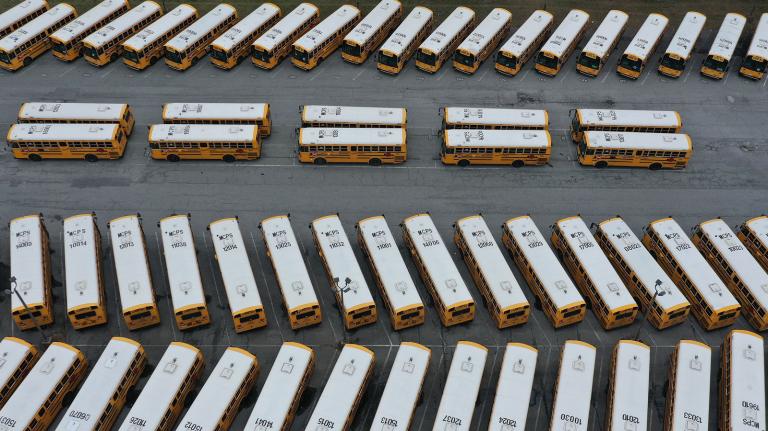Donald Cohen is the founder and executive director of In the Public Interest, a national research and policy center that studies public goods and services. He’s also the co-author, with Allen Mikaelian, of The Privatization of Everything.
In his State of the Union address, President Biden announced some 4,000 new infrastructure projects, among them fixing more than 65,000 miles of highway and 1,500 bridges by the end of the year. Biden promised the $1.2 trillion bill would unlock the full potential of a clean energy economy, but there’s an obstacle. The bill requires state and local governments to consider public-private partnerships for large transportation projects, and there’s nothing to dissuade municipalities from using the money to partner with the private sector in other areas — for instance, to build electrical infrastructure or operate a drinking water system. The bill also lifts caps on how much cities and states can subsidize private financing through bonds.
As the head of a national public policy research group, I’ve seen many well-intentioned public-private partnerships make climate progress more difficult. Private investors — often a Wall Street bank, multinational corporation, or global water company — front the money to build infrastructure or manage an asset in exchange for lease payments or the right to collect revenue, but there are almost always conditions that limit communities’ ability to make policy independent of corporate interests.
After decades of tax cuts for corporations and the wealthy, governments at all levels are starving for revenue. During the last 35 years, the federal government halved investment in infrastructure, which subsidizes state and local spending. As municipalities become desperate for cash, the more receptive they are to public-private partnerships. And even the biggest cities can lack the resources and expertise — and sometimes the willingness — to effectively negotiate these complicated deals, locking themselves into contracts that rob both taxpayers and the climate.
In 2008, Chicago leased its parking meters to investors including Morgan Stanley and a Middle Eastern sovereign wealth fund. In return the investors paid a lump sum of $1.16 billion, which helped the city’s budget amid the Great Recession. But soon after the ink was dry, an analysis found that the city had undervalued the meters by around $1 billion. Today, with 60-some years remaining on the 75-year partnership, the investors have already made a 143% return on their investment.
Not only did Chicago sign away revenues that could have been spent on public schools or expanding public transit, the city is also required by the contract to pay the investors if it makes climate-friendly changes that reduce parking revenue, such as replacing parking spaces with bike or dedicated bus lanes. Chicago-area transportation planners told sociologist Stephanie Farmer that the “compensation clause” is tying their hands in efforts to build environmentally sustainable modes of transportation.
Many local governments have, out of fiscal desperation or lack of due diligence, also signed contracts that include troublesome clauses in public-private partnerships with trash incineration firms. Known as “put or pay,” these clauses oblige the government to either give the company a certain amount of trash or pay a fee. That’s what happened to Florida’s Lake County when it helped finance a new incineration plant for the publicly traded corporation Covanta. When the recession hit in 2008 and trash volume plummeted, the county scrambled to find more. One Lake County manager insisted, “We’re looking all around to find what waste we can. … Not doing this will be very, very costly.” And while they got seven cities to help them feed the beast they’d created, a Lake County official noted, “We’re also not promoting recycling in a big way right now.”
In 2015, Indianapolis signed a 10-year deal with Covanta to sort through the city’s trash for recyclables and burn what it couldn’t recover. The city agreed that it would not undertake or even promote any new recycling or allow the small program to grow by more than 5 percent. If the city exceeded that, it would pay Covanta up to $4 million per year until the contract ended. There are some 75 facilities across 25 states that recover energy from the combustion of municipal solid waste, but there is no national data on contract provisions, and states have varying degrees of transparency.
Despite the warm and fuzzy name, public-private partnerships are a form of privatization. They embed private interests into public goods that belong under public control, like schools, transportation, and water systems. Thankfully, virtually every infrastructure decision will be made by governors, legislators, mayors, council members, administrators, and other public officials. (When it comes to infrastructure, it’s helpful to think of the federal government as merely the bank that finances them.) In the coming months and years, community members will have opportunities to influence how the money is spent and whether privatization is considered.
Despite the warm and fuzzy name, public-private partnerships are a form of privatization. They embed private interests into public goods that belong under public control.
We must show up to council meetings, legislative sessions, school board meetings, town halls, and other public meetings where decisions are being discussed and ask hard questions. If our leaders are considering signing a contract with a corporation, will the contract limit our democratic rights? Will there be perverse incentives that work against our public policy goals, especially when it comes to the climate? If a private company thinks it can make money from an infrastructure project, why can’t we? Unless a public official is ideologically committed to privatization, the answers to these questions will often expose the true risks posed by a proposed public-private partnership.
Even if the procurement process has already started, asking the right questions can convince public officials to change course and protect the public. In 2017, for example, a coalition of community groups including my organization was able to convince the Washington, D.C., city government to halt a plan to build a new jail using a public-private partnership. We raised questions at public meetings about the motives of the corporations and published articles shedding light on the project’s risks.
If leaders are set on a partnership, we must demand that they protect our communities, workers, and the environment in the final contract. This means limiting the use of compensation and non-compete clauses, and including community input, transparency, livable wages for workers, and other pro-public provisions.
Banks, investors, and corporations have fundamentally different goals than governments. They exist first and foremost to make a profit, not to promote equity, maintain a democratic society, or limit carbon emissions. We must make sure our infrastructure investments fund projects that are truly public.
The views expressed here reflect those of the author.
Fix is committed to publishing a diversity of voices, and we want to hear from you. Got a bold idea, fresh perspective, or insightful news analysis? Send a draft, along with a note about who you are, to opinions@grist.org.



